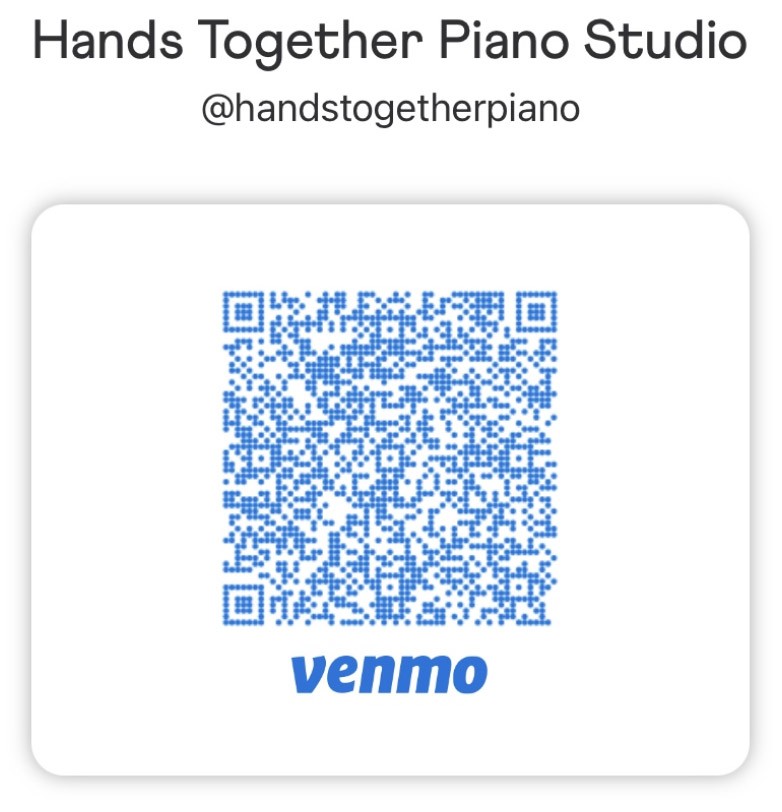Frequently Asked Questions
Please click the [+] to expand answers to frequently asked questions we have received over the years.
Hands Together Piano Studio is a beautiful home-based studio conveniently located at 210 Church Street in Willow Grove, Pennsylvania, close to the intersection of Davisville Road and Old York Road (Route 611). There is ample street parking.
There is no charge for the introductory session. This is an opportunity for you to see the studio, meet the teacher, enjoy a mini-lesson, and get answers to any questions you may have about piano lessons, instruments, tuition and scheduling.
Lesson times are available Tuesday, Wednesday and Thursday from 10 A.M. to 8 P.M, and Saturday from 10 A.M. to 3 P.M. The studio is closed Sunday, Monday and Friday.
Most children begin lessons at ages 5 through 10. Some students begin as teens or adults. No matter if you are 5, 15, 35, or 65 - it is possible to begin learning piano at any age.
Almost all students take private lessons. Occasionally, siblings share a lesson time. Informal group classes are offered three or four times a year where students play for each other in a relaxed environment. Students enjoy hearing the other students play, and they gain confidence and experience in playing for others. Performance in group classes is encouraged but not required.
Yes, students can have weekly lessons online using Zoom rather than in-person. Online lessons can also be used as a backup when students are unable to get to the studio for reasons such as illness, inclement weather, etc.
Students have weekly 30, 40 or 45 minute lessons during the school year except for scheduled holidays. Summer lessons are flexible to accommodate camp and vacations. Adults or home-school students who are available during school hours can take morning lessons, weekly or bi-weekly, or have flexible scheduling if needed.
At weekly lessons, students will learn how to practice, to make the best use of their practice time at home. Practicing 4-5 days a week, at least 20 minutes a day will ensure steady progress. Students who are more serious about piano will be practicing more than 30 minutes a day, most days of the week. All students have weeks where they are unable to practice and this is expected.
Learning music theory is fun, and knowledge of music theory is essential to reading, understanding and appreciating music. Students learn music theory and basic chords from their very first lessons in a hands-on way that is easy to understand. In the beginning, music theory is learned through simple exercises and through the songs students study each week. Theory books which complement the lesson books are also helpful. My favorite supplemental theory book is Fundamentals of Piano Theory by Keith Snell.
Learning to read music begins in the first few weeks of lessons. Learning to play songs in the beginning without music is also fun and helpful. Beginning students may learn songs by rote, by ear, by finger numbers or letter names, simple patterns or improvisation. Students naturally progress from playing songs without music to learning songs by reading notes.
Yes! Recitals and other performance opportunities give students a real confidence with their playing skills. Parents, family, and friends enjoy hearing all the students play. Informal get-togethers at the studio are offered three or four times a year to give students an opportunity to play for their peers in a relaxed fun environment. This gives them experience, encouragement and motivation for performing at the annual family recital held each June.
No student is required to participate in recitals. However, most students are eager to play for others and find performing to be a positive experience.
Parental attendance at lessons and supervision of at-home practice has enormous benefits to both children and parents. Parental attendance helps children understand that learning to play the piano is valued and important to their parents, giving children greater incentive to learn and practice.
By observing weekly lessons, parents know what and how their children are supposed to practice at home. Parents can learn to play some of the songs along with their children for their own enjoyment and to better assist with at-home practice. Parents can assist and encourage their children with at-home practice in many ways: scheduling a regular time for practice, making sure children practice everything in their assignment book (as well as simply exploring and having fun), listening to their children play (without criticism) and having informal concerts for family or friends. For best results, parents need to supervise young children to some extent while they practice because young children will not practice effectively on their own.
Yes! Many of the students at Hands Together Piano Studio are adults, some retired, some with full-time jobs. Most adults start as beginners. Some have taken lessons as children. Adult students currently range in age from mid 20's to 70's. It is fun and fulfilling to play the piano no matter what your age!
Yes. The studio policy covers such topics as holidays, tuition, missed lessons, and guidelines for at-home practice. When you come for an information session you will get a copy of the studio policy.
Tuition is paid every other month by cash, check or Zelle. A discount is offered for annual payments. Please contact the studio for prices.
Nothing is better than a good acoustic piano for touch and tone quality. However, if you are planning to purchase a digital piano or keyboard, make sure it is full size, with 88 keys that are touch sensitive and weighted. If your keyboard is portable, you will also need a stand and a sustain pedal, which plugs into the back. An adjustable piano bench is very helpful so the student can sit at the proper height.
